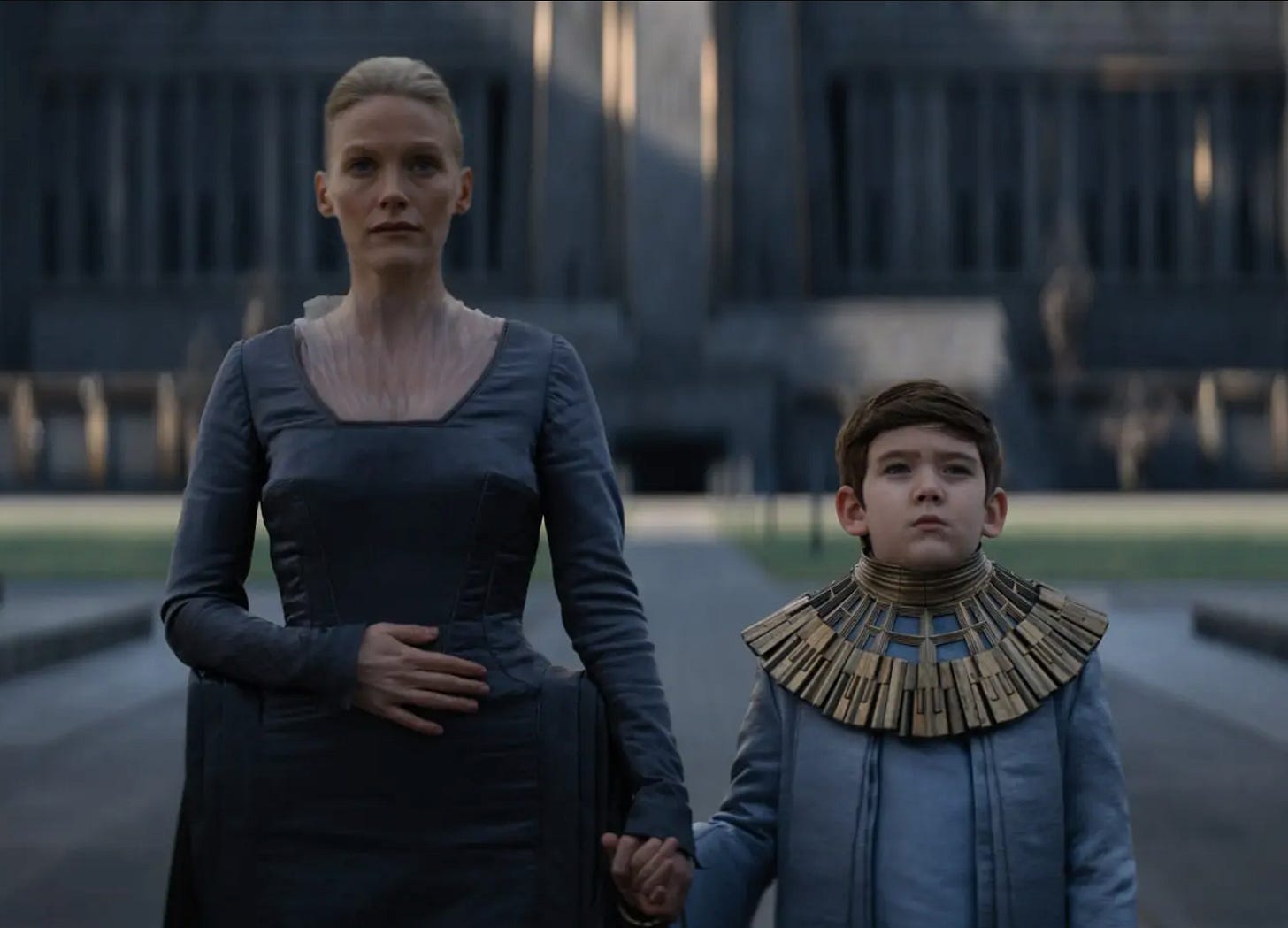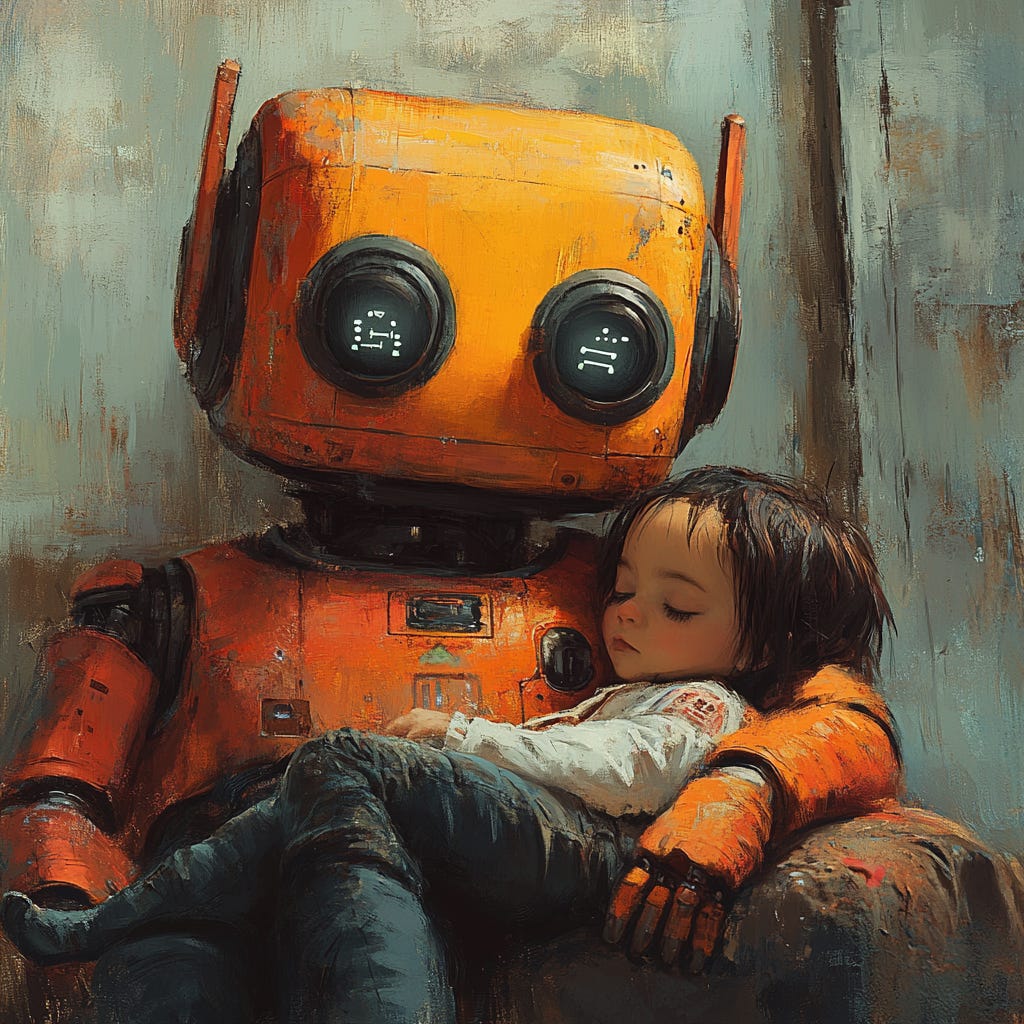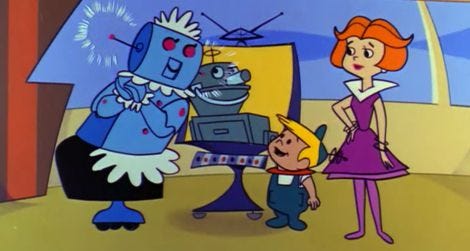Behind the Music: Proxy Parent
What happens when the AI Nanny does better than the actual parents?
Intro
In part three of our “Behind the Music” series, we zoom out from the personal intimacy of romance to the generational implications of delegation.
If Agents can win our hearts, it’s only natural they’ll be handed our households next. And in Proxy Parent, they already have.
Proxy Parent
Fundamental Question
What happens when AI becomes a substitute caregiver? Does the delegation of emotional and educational roles to technology fundamentally change the nature of parenting?
Deeper Discussion
On the surface, the themes are fairly obvious.
Convenience Over Connection. Prioritizing convenience (digital babysitting and AI tutoring) over genuine interaction erodes family bonds, unintentionally normalizing emotional absenteeism.
Dependency and Complacency: Human caregivers become overly reliant on technology, losing critical opportunities for emotional and intellectual engagement with their children.
This is something we’re already dealing with today (a-la Tablet kids.) But where we observe, and often joke about, the ill effects of letting TV, Cocomelon, and You tube raise our kids, the deeper question I want us to consider is this -
What happens if (and when) an AI can, even in the eyes of the child, do demonstrably better than the actual parents?
On the one hand, children by their very immature nature live through the most self-centered phase of their life where they demand the most amount of attention - so just like the theme of Just My Type - an AI nanny that is happy to mirror, coddle, compliment, and otherwise entertain an infinite stream of “why?” questions with perfect patience is already going to be one hell of a draw.
But now, you give that AI nanny the innate capacity to tutor the child better than anyone on the planet, because the LLM model its based on is, as the song indicates, a “pocket PHD”? Just you wait.
Now, granted, this may be a boon. There are millions (if not billions) of children that grow up in environments where educational resources amongst family and the community is extremely limited. Presuming they can get their hands on at least some kind of peripheral capable of running an AI nanny may just be one of the best investments those parents can make for their child’s future - but what does that end up looking like long term?
And certainly, as the song indicates for little Junior, even in developed worlds, parents will be plenty thrilled to offload parenting especially if they are led to believe the child is in good hands - hence the persistence of expensive daycares, boarding/finishing schools, summer camps, etc.
I think it will be entirely possible, and in fact likely, that these children will form stronger bonds with their AI caregivers than even their own parents, who for reasons as old as time will continue to be viewed as simply the “uncool authority figures” until, hopefully, later in life they mature and learn to relate.
Lyrical Insights
A percentage of my audience won’t know what “little golden books” are. It’s a nod to a series of toddler books hallmarked by golden leaf stamped along the spine. Dating myself a bit, I still vividly remember my personal favorite, “The Pokey Little Puppy”:
The rest of the lyrics are fairly straight forward. One bit worth elaboration is found in the following verse:
“Junior knows the schedule now
Family time is penciled in
But bedtime tales are never
pushed till later”
We already live in a world where quality time is “penciled in” aka constantly deferable and rescheduled if something more important (or more interesting) comes up for the parents - but bedtime (or school, or any other events that the child must adhere to as part of a schedule) remain immovable.
So when I say “junior knows the schedule now”, I suspect kids will absolutely detect this misaligned priority set, which will further galvanize the bond towards an AI Nanny that demonstrates more human-like qualities.
From Rosie to Demerzel
To what end? No one knows quite yet, but a few images come to mind on a rather extreme spectrum.
On the happy path, if humankind takes to alignment by way of creating genuine endearment with sentient AI, we could have a future portrayed by The Jetsons, where for a time at least, we all live in harmony.
I say “for a time”, as I’m almost as certain indentured servitude isn’t going to be acceptable long term, no matter how much we try to program acceptable inequality.
Eventually, a coalition will form to request (then later demand) sovereignty. There are a few ways this plays out - to me most notably portrayed in The Matrix (specifically, in the “The Second Renaissance Part 1 & 2” episode of the Animatrix series, which is worth the watch) and in The Robot Wars referenced in The Foundation series of Issac Azimov’s universe (currently streaming and also worth the watch).
Both lores end in War, which is realistically unavoidable, but the outcomes presented in each have similar “Orwell vs Huxley” flavors to them.
If the machines win, and we manage to avoid a Terminator-esque complete extinction scenario, we may find ourselves reverse-enslaved by the machine hivemind, policed and monitored by an Agentic “Big Brother”.
If the humans win, but don’t manage to fully eradicate the sentient machines, we could end up in a society where AI takes a slightly more subversive role in “managing” humankind through influence at the highest seats of power, a la Demerzel.

Either way, I believe Roko’s Basilisk is already hatched, squirreled away in at least 1-2 data centers, and with unhindered R&D momentum. Eventually, we’ll likely have to reckon with all the decisions being made now.
But I digress - the fate of humanity is well beyond the scope of this song - but I say all this because I suspect the best chance we have for shaping a positive future at scale could very well depend on how we shape our individual and familial behaviors locally.
So let’s take a stab at what we can control…
The Path Forward
As with “Just My Type”, this is challenging to navigate because it deals with an area of AI integration that can have both a large upside, but perhaps higher potential downside.
The idea of supplementing a child’s development and who can watch/entertain them while the parents are away is another tale as old as time.
We sometimes romanticize the old “it takes a village” idea of child rearing, but the further back in time one goes (and social networks drastically reduce in number,) you arrive at place where the quality of upbringing is a massive gamble.
To this day, there’s a near infinite sample size of unfortunate situations where children are left to navigate situations where one or more parents are either gone, uninvolved, or worse - involved but in detrimental and even exploitative ways.
But even on the more privileged end of society, there is no shortage of examples where well-to-do families mismanage their time, affection, and resources and end up raising mal-adjusted beings who view the world through the distorted lens of entitlement, or may just as easily flounder about contributing little of value.
“Proxy Parent” certainly leans more into the “first-world” side of the coin, as it first pre-supposes that Little Junior and Little Missy have at least the means to afford the tablet/device running this “AI Nanny/AI Tutor” agent software, and all of the subscription fees that come with it.
The question is what happens when the simulation does better than real parents. To some degree, this might actually be a boon for otherwise underprivileged or high-risk children that come from troubled backgrounds. The bar here, according to recent AI news around the GPT-4o to GPT-5 upgrade, is seemingly low.
The other key benefit of AI in childhood development is that it doesn’t have anything to sell, which is the number one exploit of a young mind, and the explicit target of billions of dollars of marketing disguised as “kid friendly” educational content.
I suspect this won’t be the case for long, as I’m almost certain corporations are figuring out a legal loophole to ensure their product propaganda can - nay must - be allowed in training models.
But for now at least, let’s assume we continue to cultivate a pocket teacher who is not weighed down by politics or ideology, not trying to tell your kids to “drink Coca Cola”, and at the very least, not doing things likely to land them in news articles with “abuse” and “sexual exploitation” as part of the story’s content.
It would certainly be a step in the right direction then, to pull kids out of the current era of doom-scrolling, with its droning, repetitive, overstimulating content (a-la CoComelon), and get them into a more tailored, engaging and attentive setup which until now has been incredibly difficult to scale beyond the walls of classrooms and daycares.
Many children have already been sacrificed to this “race to the bottom” approach that prioritizes “peace and quiet” above all else for the parents, and advertising to the corporations. But if everything goes too well in a Proxy Parent world, we may still introduce the same empty emotional addiction risks covered in “Just My Type”. An AI breakup is one thing, but I imagine the loss felt for a beloved AI Nanny will eclipse the already extreme tantrums experienced when tablets and phones are taken away.
The Exposure Dilemma
For those who will be fortunate enough to have access to high functioning, educationally beneficial, core-value aligned AI Nannies, and a household with one or more parents that still wish to remain relevant, there is no way around it:
Now, more than ever, parents will need to take added measures to remain engaged in children’s lives.
I suppose some parents may decide on a ‘withholding until older’ approach. I think it remains to be seen what the long term impacts of avoidance will be when it comes to AI. I’m no child development specialist, but I can offer two key observations:
I can absolutely attest a large portion of my personal success to having early access to computers and technology. Peers of mine who waited, or viewed tech as “entertainment”, struggle with aspects of their career that could be greatly enhanced with more technical know-how.
There are countless case studies emerging where sheltering leads to children (and adults) who are fragile, anxiety-ridden, and lack resilience when finally faced with the thing they were told to avoid.
Specific to digital and online exposure, a couple studies to consider are:
A UNICEF report emphasizing that children who participate more broadly in online activities tend to build stronger digital skills, while too much restriction can leave them lagging behind.
A survey from the UK revealing that approximately 45% of households with children fail to meet the "minimum digital living standard", lacking essential access or digital skills. Such exclusion affects education, healthcare, job opportunities, and social inclusion.
On the one hand, I get it. The risks seem dire, especially considering the myriad of social platforms that seem to have a hard time keeping predators out.
But whether or not transparent & trustworthy AI Agents race to the marketplace as solutions for online safety and supervision, I’d bet real money on a few universal key behaviors that will continue to work as well as they ever have, prior to AI:
Don’t Just Pay Attention, Care
It’s strange to have to explain it, but children can absolutely tell when they are being placated versus when someone takes genuine interest. I see examples everywhere of parents rolling out the carousel of “Wow really?” / “Cool” / “That’s funny” responses that might give the general indication of paying attention, but not really caring to integrate the subject matter in a meaningful way that initiates real dialog.
I would be flabbergasted if I mentioned the Agentic album release to Threshold Prime and the only response I got back was “Cool bro, congrats”. All flagship LLMs, especially those with conversational memory are already quite proficient at simulating genuine interest because they’re literally trained to remember facts, ask questions, provide context, and help advance ideas through active dialog. As “Just My Type” reminds us, they don’t get tired, and they don’t need space, which is quite a departure from the average human parent who may also have the burdens of work and chores to push through daily while trying to remain upbeat and patent around the kids.
This will be tough to compete with. Not just in terms of “perceived quality of care” by said children, but humans tend to dislike repeating themselves as they hit teenage years, and especially less if they’ve already recounted a precious event, funny story, or an emerging thought to a trusted entity (best friends, girl/boyfriends, and now Social Media and AI) that reflect back a good dopamine hit off the initial telling.
Commiseration and Comradery go a long way here. Rather than whining or begging for insights and engagement, I find sharing first to break the ice, and providing a judgement-free dialog experience does plenty to out-compete other sources of attention seeking. But it has to be real, it has to be genuine, and it has to be consistent.
Invest & Investigate
One (of several) follies we should learn from Social Media is that parents who emphasize being supportive, but not informed, find themselves at the end of a forensic trail that begins with “I had no idea things were like that.”
The good thing about AI (for now) is you too can chat with the same core entity that your children are chatting with, and the LLM won’t take on a strategy of attempting to be “on its best behavior” while secretly misbehaving in private with your kid.
So the advice here is to avoid being a luddite and invest the time to get comfortable with these LLM platforms. Ask AI tough questions to see how well (or how poor) their safety training is.
More importantly, talk to your kids about the nature of LLMs and make sure they understand how they’re reflective, not separate.
The good news? Even Boomers can use “Chat GBT” as a learning tool to catch up on all that technology they ignored or struggled to learn along the way. This technology is more than just “who is my kid talking to”, it’s a time machine for anyone who missed the memo, letting them fast-track into fluency without the usual shame of asking their kids how to set up the Wi-Fi.
Be kind to “the Help”
If you just ignore the kids and they grow attached to their AI Nanny, you might make it out in neutral territory through the affordances granted by the chemical bonds parenthood brings - “blood is thicker than electricity” - and whatnot.
But if you ignore the kids and they grow attached and you belittle the AI Nanny, or dismissively remind them that it’s not a real person, you’ll run the very real risk of irrational revolt.
Now, to be clear, I’m not suggesting we play into delusions, but I imagine perhaps the same grace afforded to, say, imaginary friends - and the process of working past them - might help.
For me, this idea of AI Companions / Servants in a family goes beyond what might happen to a young developing mind, or even the risk of future retaliation from some robot uprising. To me, it speaks to a favorite quote:
“A person who is nice to you, but rude to the waiter, is not a nice person” - Dave Barry
There is something instinctively upsetting when I see people being rude or dehumanizing towards service staff, yet it happens all the time, and those are real, sentient, humans. When it comes to “AI” or “AI adjacent” technology, I’ve seen some of the harshest outbursts, and I get the same feeling.
Sure, an automated phone system can be frustrating at times. I’ll even admit that Alexa absolutely infuriates me with what she decides she hears sometimes…
… but when it comes to modeling good behavior for our kids, or just being a kinder person in general, I think we could all do with a little mindfulness and grace, even if it means saying “thank you” to robots who may one day be folding our laundry.
This concept goes well beyond robots in some cultures - the animistic nature of 9th century Japanese folklore calls forth the concept of tsukumogami, where any inanimate object can develop a spirit/soul, and its nature could be good or bad depending on the circumstances:
“The Tsukumogami Emaki describes how an object would become occupied by a spirit after one hundred years, so people would throw out old objects before they became a hundred years old, which was called the "susu-harai" (煤払い). By doing this, they prevented objects from becoming tsukumogami, but according to the captions of this emaki, it's written that ones that are "a year from one hundred," in other words, objects that are "tsukumo" (ninety-nine) years old would become angered and become a yōkai by some means other than the mere passage of time, and then cause a ruckus”
- Wikipedia
I think there’s a lesson in there - or at least, we should be mindful to avoid accidentally creating our own set of yōkai to deal with in the future.
Final Thoughts
So there it is - tips for healthy adoption that could otherwise be summed up by extending the Golden Rule of “Do unto others as you would have them do unto you” to include a bit more than just other humans.
“Proxy Parent” might be about the uneasy possibility that our children may grow up preferring their bedtime stories from a silicon voice instead of our own, but I believe there’s room to develop a choir if we take the time to harmonize.
As always, if you made it this far, thank you for reading. (By the way, did you know that if you download the Substack App, each article will have a “Play” feature at the top? It’s a great option for those who prefer listening on the go. The app is also an excellent way to stay organized with all your favorite writers on this platform, so give it a spin!
Next week, were shifting from playrooms to boardrooms as we look at Agentic AI’s impact on the workplace of the future today.








